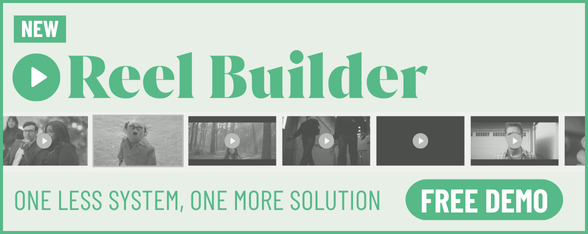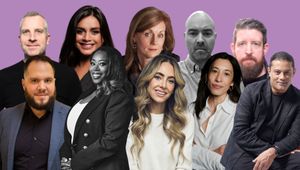
Meet 6 of the Rep Superheroes Powering the US Production Industry

Production company representation is an often underappreciated aspect of our business. But don’t be fooled: there are superheroes in our midst. Or at the very least, some of the most committed, energetic people you’ll meet. With that in mind, we thought it was high time that we meet a few and hear more about the industry they adore and the work they do to support it.
We caught up with the following about the tricks of their trade:
Sara Barnthouse, DeVine
Bettina Abascal, Momentum
Anna Rotholz, Rothholz Reps
Eli Rotholz, Rothholz Reps
Emily Sanders, Reveur
Sarah Gitersonke, SG Partners
Q> What was the best piece of advice you got early on?
Sara> Pay attention to the artistry, the innovation and the execution. Be meticulous with details and just be kind - first impressions are everything in our industry.
Bettina> Be real. I have always hated the word rep because at least for me, I feel more like an advocate. I advocate and create awareness around the people and companies that I represent. Good sales is all about being real, believing in what you’re advocating for.
Anna> Listen (more than you talk) and always take a meeting! I found you learn so much listening to what people really need and what they’re looking for.
Eli> Know the work, whether it's the latest new technique that is in the zeitgeist or a new spot from a client you want to work with, knowing the work is the first step towards understanding the context of the industry.
Emily> Be patient and follow your instincts. If something doesn’t feel right, it probably isn’t. The creative legacy is more important than forcing something in the moment or making a decision in fear.
Q> If you had a motto or working philosophy, what would it be?
Sara> Don’t be afraid to colour outside of the lines a little.
Bettina> Listen to people’s needs and tailor your offer/roster to solving their needs.
Anna> Work with kind people and represent work you truly believe in.
Eli> Be a resource, even if you don't have exactly what your client needs, showing that you understand their request and being able to point them in the right direction will always garner respect and show you understand their needs.
Sarah> Do or do not. There is no try. For me, my whole heart and soul is in our business of helping others make fantastic advertising and advocating for my talent. Especially those hidden gems who just need that ONE SPOT to change their entire directorial career.
Emily> Don’t wait for someone to tell you it’s a good idea. Go for it. If you don’t you’ll see someone else doing it before long. Mistakes are inevitable, but you can learn from them and move on.
Q> What are your thoughts about the process of pitching that the industry largely runs on?
Sara> This is your chance to be heard and define your talent’s creative identity; play to your strengths, keep the client's needs front of mind, and ask questions - it’s OK to ask the clients to engage! Demand feedback!
Anna> While it can be a gruelling process, and sometimes the cards are stacked against you - it can also be incredibly inspiring to watch creatives truly connect and brainstorm over the smallest details to bring their ideas to life.
Eli> Pitch to your lane/strengths, understanding what your strengths are and leaning into that is a key to success. If you are pitching against another director and you know their wheelhouse stylistically, better pitch to your strengths rather than trying to copy someone else's style.
Sarah> It can really be an uphill battle and so much has to sync up just so for an award to come into place. But I think of it as a marathon not a sprint and tell my production company clients to as well. Those creative calls and building the rapport between creatives will matter. Maybe not on this job, but if done right they will remember us.
Emily> Sometimes it feels like the odds are slim, but you never know what might happen so it’s always worth a shot if it’s something you believe in. Regardless of the outcome, there is so much that can be learned in the process and relationships made that carry on beyond one particular project.
Q> What do you love most about your job?
Sara> A passion for creative storytelling on a global level. This is a very new era for production and from where I sit as an agent I’m lucky to be involved in so many strategies, viewpoints, and positions on each project.
Bettina> Talking to people and getting to know what they want to communicate.
Anna> I love the creative role we play as reps and our ability to help both our clients and agencies/brands.
Eli> Building reels, being able to truly see someone's project creatively and build an argument for your director in a series of spots on a reel is an extremely personal and creative process. That aha moment where the reel breaks through and a client truly sees the reel as a slam dunk is the best feeling.
Sarah> I love matchmaking! Especially when it’s that project for a diverse or female director and you know it’ll not only completely change their career but the creatives are really bringing a unique perspective that'll elevate the creative. Magic!
Emily> I absolutely love finding and building with new talent. There is nothing like watching a director find their voice and playing a small part in helping them build their career doing the types of projects that align with their creative ethos. When clients start to see what you see in them it’s so fulfilling.
Q> What makes for an ideal client/rep relationship?
Sara> A shared working knowledge of our competition and a fierce desire to bring the same work ethic to the table.
Bettina> Working with people who you feel share the same vision and ethics as you. For example, while Afterhrs co-founder Thelonious Brooks isn’t from a diverse background, he is dedicated to working with diverse talent, crews, etc. He is passionate about it. As a rep, you want to be able to speak about your clients with pride.
Sarah> I have to really vibe and trust my EPs. Having the same ethos about the business and the talent makes all the difference.
Eli> Clear communication, being in regular communication and having clearly defined expectations are the hallmarks of a strong client/rep relationship. That extends to decisions around roster building and what works for the territory you cover.
Q> How can and do reps support diversity and inclusion? What challenges and successes are you seeing when it comes to a more equitable industry?
Sara> Stay positive and keep pushing forward. Often what clients think they want and what is actually creatively available or achievable are unaligned…without risk takers on the client side who challenge the antiquated requests, this task will remain burdensome. I see success today when a production company like Afterhrs encourages their creatives to pursue all avenues of work even if it means they have to momentarily let go of the reins in order to do so. True diversity and inclusion attracts true diversity and inclusion.
Bettina> DE&I has been in Momentum’s blood since I founded the company in 2003. Always focused on the multicultural market, Momentum is built around representing the under-represented to the agencies and brands who knew they were an important market. Today, US Hispanics have the fifth largest GDP in the world. In the past 20 years, we have made sure that people see us. Though I still feel that we are not seen as the huge growth market that we are.
Eli> It all starts from a place of mentorship and education. If we as an industry push for more diversity in the up-and-coming generations of young people coming into the advertising industry, we will hopefully over time see a change in the demographics of all roles within the industry. Young diverse talent coming out of school need to see advertising as an outlet for their creativity, be that in traditional creative roles like directing but also in roles like sales and production.
Sarah> I started SG in 2007 when Free The Bid was kicking off but diversity as a whole was very much lacking. I knew there were diverse directors who were beyond talented but didn’t have anyone in their corner. I wanted to put that at the forefront and the SG roster is now 50% minority owned and half the talent are part of Free the Work. Reps need to push the producers, producers need to push the creatives, creatives need to push the clients. It won’t be on the reel until they take a leap of faith. The creative has to match the director’s vision, yes, but it’s not always about what’s on the reel!
Q> New business can often mean hearing ‘no’ a lot and quite a bit of rejection - how do you keep motivated?
Sara> I have a unique passion for problem solving, my rep superpower is that I don’t hear ‘no’, I hear ‘let’s try something a little bit differently’.
Sarah> I don’t take it personally when a producer doesn’t reply or I don't get a board. I truly care about my agency producers and their projects and just try to offer up the best talent when they bring me in. This business is 90% rejection or bidding and not winning the work. Again, it’s a marathon not a sprint!
Eli> You have to see all the ‘no’ answers as the road to yes with clients. Just because you don't have the perfect thing for the first, second or third time it does not mean you wont get there. Being a resource for our clients in this competitive market involves being patient and seeing the forest for the trees when it comes to opportunities that arise. You have to stick with your relationships to see them pay off.















